新概念1册_nce1-lesson51-52
(英语学习)新概念第一册lesson51-52
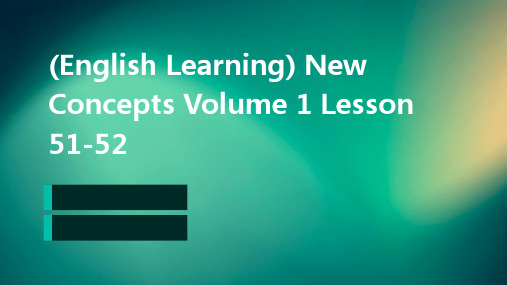
Expression
In addition to the vocabulary, students also need to learn a set of common expressions used in the context of sports and fitness, such as "I'm feeling a bit out of breath" or "I need to do some strength training". These expressions will
Adverbial clauses
Another focus of this lesson is on adverbial clauses, which are used to provide additional information about a situation or event. Students learn how to identify and use different types of adverbial clauses, such as time clauses ("When I finish my workout") or condition clauses ("If I don't exercise regularly").
新概念英语NCE1_Lesson51-52(共27页)课件

to grow crops(播种粮食). ★ It is the beginning of the year.
大家都来读 单词吧!比 比谁读的最
棒
• Greece • climate • contry • pleasant • weather • spring • windy
• warm • rain • sometimes • summer • autumn • winter • snow
January 一月 February 二月
• 春天的天气怎么样?
• What is the weather/climate like in +时间/地点? • What’s
• weather:较短时间内的天气变化 • climate:较长时间内气候的规律
Spring
What’s the weather like in spring?
Lesson 51
A pleasant climate
Let’s review
• butcher • husband • chicken • tomato • lettuce • pear
beef steak truth potato pea grape
lamb mince either cabbage bean peach
Text
• Where do you come from? 你来自哪里? • I come from Greece.我来自希腊。
新概念英语NCE1_Lesson51-52(共61页)课件

pleasant 宜人的
The flowers smells pleasant.
花儿闻起来很舒服。
----What’s the climate like in your country? 你们国家气候怎么样?
----It’s very pleasant.
非常宜人。
adv. 副词
pleasantly 令人愉快地
Greece /gri:s/ climate /`klaimit/ country /`kʌntri/ pleasant /`plezәnt/ weather /`weðә/ spring /spriη/ windy /`windi/ warm /wɔ:m/ rain /rein/ sometimes /`sʌmtaimz/ summer /`sʌmә/ autumn /`ɔ:tәm/ winter /`wintә/ snow /snәu/
• We give her a warm welcome. 我们热烈的欢迎她。
snow v.下雪 n. 雪;积雪
• We take a walk in the snow. • 我们在雪中散步。
• It is snowing outside. • 外面正在飘雪。
snow----snowy 积雪的
n. 名词
pleasure 快乐
warm /wɔ:m/ adj.温暖的
• warmly adv. 温暖地
凉爽的 cool
冷的
cold
warm up 变得暖和;热身
warmhearted adj. 热情的;亲切的
warm adj.温暖的 adj. 热心的;热忱的
• Is it cold or warm in autumn? 秋天是冷还是暖呢?
新概念1册 nce1-lesson51-52

H: What’s it like in summer? D: It’s always hot in June, July and August. The sun shines every day.
H: Is it warm in autumn? D: It’s always warm in September and October. It’s often cold in November and it rains sometimes.
或询问人物或事物的外观或特征: What's your brother like? 你兄弟是个什么样子? What's your house like? 你的房子是什么样的?
许多形容词可用以回答What…like? 这样的问题,并可根据上下文给以笼 统的或确切的信息。例如课文中表示 天气或气候的形容词有pleasant(宜 人的),windy(有风的),hot(热 的),cold(冷的),warm(温暖的)
H: Is it very cold in winter? D: It’s often cold in December, January and February. It snows sometimes.
频率 副词
sometime s often
always
10 20
30
40
50
60
70 80 90 100
语法 Grammar in use
What…(be. look, etc.) like? 我们把What…like? 这一句型用于询 问事物的状况,例如天气、气候等: What's the weather like today? 今天天气怎么样? What's it like today? 今天怎么样? What's the climate like in your country?
2020新概念第一册-Lesson-51-52-课堂及课后练习

新概念一Lesson51课内语法三、单词拼读、过关、讲解。
1.Greece-n 希腊。
eg:He comes from Greece. Greek-n.希腊人(国籍)。
adj希腊的。
eg:He is Greek.2.climate-n.气候。
eg:What's the climate like in your country?weather-n.天气(短时间内天气变化)。
eg:What's the weather like today? eg:fine weather好天气。
windy weather有风的天气。
weather forecast 天气预报区别:climate:气候(长时间的天气状况),指某一地区数年间的天气情况。
weather:指某一特定的时间内晴、雨、风、雪变化等。
3.country-n.国家;乡下;乡村。
in the country在乡下。
(country反义词city)4.pleasant-adj令人愉悦的;宜人的。
pleasant weather 晴朗的天气。
区别:pleasant:是常用词,指“愉快的”,强调“所修饰的人或者说物有给予愉快的性质”,表示被修饰的对象是由于令人高兴的外表或热切的气质而使人感到的一种自然吸引力。
pleased:指“喜悦的”“满意的”,用于表示说话人自己的场合。
I'm very pleased.我很满意。
pleasing:指“令人愉快的”“合意的”,另外多一层有意识、去讨人喜欢的含义,eg:The food is pleasing to my taste.6.spring-n.春季;弹簧。
spring flower春花。
the Spring Festival春节。
summer-n夏天。
in summer在夏季summer school暑期班summer vocation/holiday暑假autumn-n.秋天(Br.)fall n秋天in winter在冬天 a hard winter严冬7.windy-adj有风的。
新概念英语第一册第51-52课:Apleasantclimate
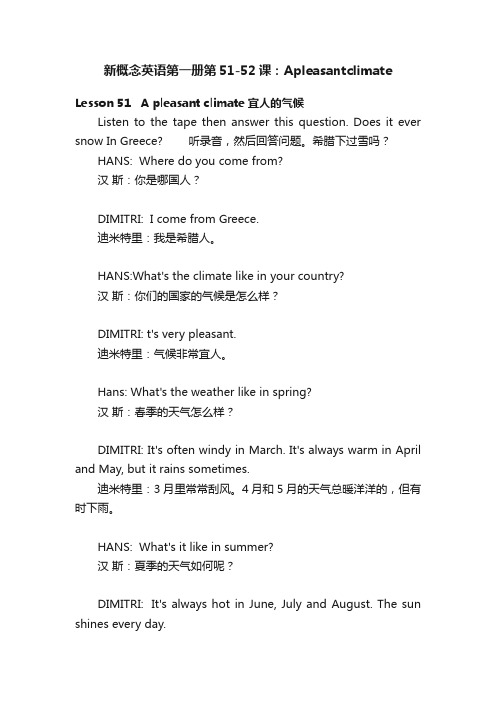
新概念英语第一册第51-52课:ApleasantclimateLesson 51 A pleasant climate宜人的气候Listen to the tape then answer this question. Does it ever snow In Greece? 听录音,然后回答问题。
希腊下过雪吗?HANS: Where do you come from?汉斯:你是哪国人?DIMITRI: I come from Greece.迪米特里:我是希腊人。
HANS:What's the climate like in your country?汉斯:你们的国家的气候是怎么样?DIMITRI: t's very pleasant.迪米特里:气候非常宜人。
Hans: What's the weather like in spring?汉斯:春季的天气怎么样?DIMITRI: It's often windy in March. It's always warm in April and May, but it rains sometimes.迪米特里:3月里常常刮风。
4月和5月的天气总暖洋洋的,但有时下雨。
HANS: What's it like in summer?汉斯:夏季的天气如何呢?DIMITRI: It's always hot in June, July and August. The sun shines every day.迪米特里:6月、7月和8月的天气总是炎热的。
每天都出太阳。
HANS: Is it cold or warm in autumn?汉斯:秋季的天气是冷还是暖呢?DIMITRI: It's always warm in September and October. It's often cold in November and it rains sometimes.迪米特里:9月和10月总是很暖和,11月常常就冷了,而且有时下雨。
Lesson51-52(教学设计)-2023-2024学年新概念英语第一册

5. 创新拓展(5分钟)
任务挑战:教师提出一个任务,如:“Write a short story about what you did yesterday.”,要求学生完成。
九.重点题型整理
1. 填空题型
题型描述:填空题要求学生根据语境,选择合适的一般过去时态动词形式填入空格中。
举例:I (1) my homework yesterday. (2) a movie with my friends.
答案:1. finished 2. watched
2. 选择题型
题型描述:选择题要求学生从给出的选项中选择正确的一般过去时态动词形式。
6. 过去进行时:过去进行时用于描述过去某个时刻正在进行的动作。构成是was/were + 动词的ing形式。例如:They were watching a movie last night.(他们昨晚在看电影。)
7. 过去完成时:过去完成时用于描述在过去某个时刻之前已经完成的动作。构成是had + 过去分词。例如:I had finished my homework before dinner.(我在吃晚餐之前已经完成了我的家庭作业。)
9. 过去完成时的运用:过去完成时用于描述在过去某个时刻之前已经完成的动作,可以用时间状语如before, after等来修饰。例如:I had finished my homework before my mother came back.(在我母亲回来之前,我已经完成了我的家庭作业。)
2020新概念第一册-Lesson-51-52-课堂及课后练习

“代替”的相关英语短语“代替”一词的英文单词是replace,或者是substitute.“代替”的相关英文短语有take the place of和instead of.Instead (副词)代替(一般放句尾) Instead of (介词短语)代替(后加名词/动名词doing/what引导的宾语从句) .in place of带来;引进;提出;挣得(报酬等);生产,产生;收获;(陪审团)下(判决):bring in 代替;而不是;更换;顶替:in place of 代替;而不是:instead of ...下面我们来看一些相关例句:1.这道食谱可以用牛奶代替奶油。
You can use milk in place of cream in this recipe.《牛津词典》2.做这道菜可以用人造黄油代替黄油。
Margarine can be substituted for butter in this recipe.《牛津词典》3.做熟的四季豆可以用来代替菜豆。
Cooked kidney beans can be used in place of French beans.《柯林斯英汉双解大词典》4.他们找到了代替她的人没有?Have they found anyone to replace her yet?《牛津词典》5.她把柴油代替汽油灌入油箱,造成发动机失灵。
She put diesel fuel, instead of petrol, into the tank causing the motor to seize up.《柯林斯英汉双解大词典》6.索菲在父亲去世后没有刻意地找一个代替的人。
Sophie was not consciously seeking a replacement after her father died.《柯林斯英汉双解大词典》7.如果你找不到自发面粉,可以用普通面粉来代替。
新概念一册lesson51-52课完整版
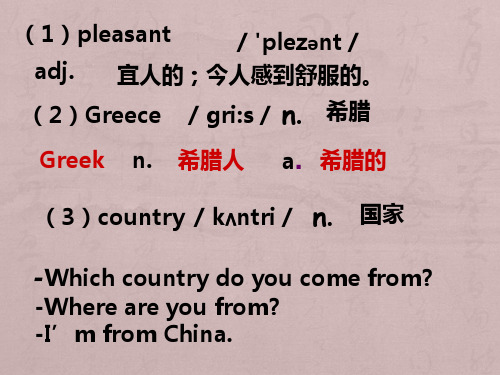
结构:be(am,is,are) 实义V. 非单三:V.原(do) 单三:V.+s(does)
1. 客观事实
The moon goes round the earth. 2. 符合现在事实情况 He is a student. 3. 经常、习惯、反复做的事情 They usually have lunch at 11:30.
Listen to the tape and answer the question:
1.Does it ever snow in Greece? 希腊下过雨吗?
HANS: Where do you come ❀ = Where are you from?(答:I'm + 国家)
from?
❀ = What nationality are you?(答:Iቤተ መጻሕፍቲ ባይዱm +
(5)、在特指和全世界独一无二的事物
的情况下,要在此名词前用定冠词the;
(6)、上文没有提到,文中第一次提到,
表示泛指,用不定冠词a/an;
(7)、上文提到过,文中再一次提到,
表示特指,用定冠词the。
• ❀ 注意冠词a/an/the的使用及区别
• (1)、冠词分为定冠词和不定冠词;
• (2)、不定冠词有2个,分别是a和an;
Spain
西班牙
Sweden 瑞典
People
American Brazilian Dutch English French German Italian Norwegian Russian Spanish Swedish
美国人 巴西人 荷兰人 英国人 法国人 德国人 意大利人 挪威人 俄罗斯人 西班牙人 瑞典人
新概念英语第一册第51-52课详细PPT课件

.
15
HANS: Where do you come ❀ = Where are you from?(答:I'm + 国家)
from?
❀ = What nationality are you?(答:I'm + 国家 人)
DIMITRI: I come from Greece. ❀ = I'm from Greece.
New Concept English
Lesson 51
宜人的气候
.
1
(1)pleasant / 'plezәnt /
adj. 宜人的;今人感到舒服的。
(2)Greece / gri:s /
n. 希腊
Greek n. 希腊人 a. 希腊的
(3)country / kʌntri /
n. 国家
-Which country do you come from?
e.g. -What’s the climate like in your country(国家)?
-It’s very pleasant.
.
17
e.g.-What’s his brother like? -He is very handsome.
e.g.-What’s the house like? -It’s so beautiful.
❀ or: 选择疑问句,表示“或者”。or前升调, 后降调。
DIMITRI: It's always warm in September and October.
It's often cold in November and
新概念英语第一册Lesson51-52笔记(语法点+配套练习+答案)
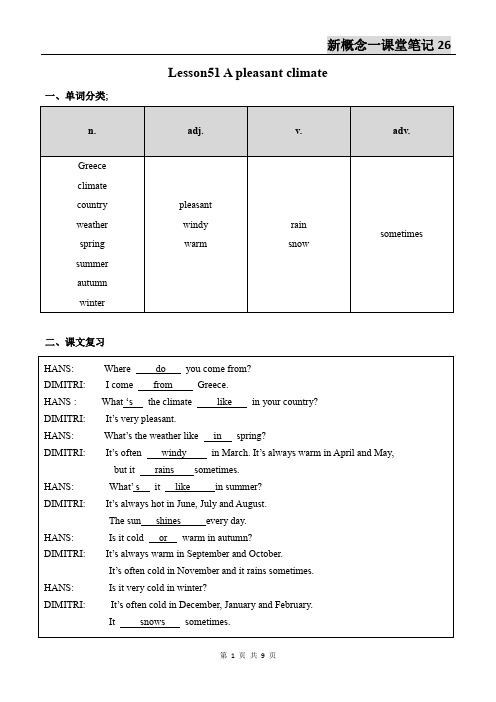
Lesson51 A pleasant climate 一、单词分类;二、课文复习三、课文重点四、词组五、语法解析1.weather天气1.It's also rainy (rain) in Hangzhou.2.Look at the snow (snow). It is snowing (snow) heavily.3.What’s the weather like in spring?It’s warm and sunny (sun).4.What a heavy fog (fog)!5.It winds (wind) a lot in autumn.6.Don’t go outside. It’s raining (rain) now.7.It’s dirty in Zhengzhou in winter, because it’s always hazy (haze).8.There are lots of clouds (cloud) in the sky. It’s going to rain (rain).2.like&be likelike v. 喜欢,助动词常用do/doeslike prep. 像,像...一样,助动词常用beWhat’s ... like? = How翻译:1.I like cats. 我喜欢猫。
2.He looks like his mother. 他看起来像他的妈妈。
3.Do it like this. 请这样做。
4.Do they like their new house? 他们喜欢他们的新房子吗?5.What’s your father like? 你的父亲是什么样的人?6.What does your father like? 你的父亲喜欢什么?回答下列问题1.What does your mother like doing? She likes cooking.2.What is your mother like? She is kind and beautiful.3.What kind of weather do you like best? I like sunny days.4.What’s the weather like today? It’s sunny.5.What’s the climate like in China? It’s pleasant.6.What’s your teacher like? She is nice.e from&be from 意思为来自... ,后跟国家1.What nationality are you? I’m French (France).2.Where are you from? I’m from China. (China)3.Where do you come from? I come from Holland. (Holland)4.Where is the girl from?5.Mike and Sue come (come) from the UK.6.Where does your friend come from? He comes from Japan.7.I come from Sweden. (同义句转换)I am from Sweden.8.Mary is from the U.S. (同义句转换)Mary come from the U.S.9.We are Chinese. (对划线部分提问)What nationality are you?10.He comes from Norway. (变一般疑问句)Does he come from Norway?4.频度副词:表示频度的副词,是一般现在时时的标志词一直,总是always ,通常usually ,经常often ,有时sometimes ,很少rarely ,从不never频度副词放在行为动词前,助动词/ be动词/ 情态动词后练习:(在正确的位置加入频度副词)1.Tom is hungry. (always) Tom is always hungry.2.What do you do on Sundays? (often) What do you often do on Sundays?3.Your mother can’t help you. (always) Your mother can’t always help you.4.Jerry goes to the park to take a walk. (sometimes)Jerry sometime s goes to the park to take a walk.5.Does he finish his homework? (usually) Does he usually finish his homework?6.I hate potatoes, so I eat them. (never) I hate potatoes, so I never eat them.5.一般现在时定义:fact ( 事实),指客观事实或客观真理1.I don’t like rabbits. ( not like)2.He wants some juice. (want)3.Do they have any friends? (have)4.I come from China. (come)5.The sun rises from the east. (rise)●结构肯定句:(非单三)主语+ 动词原形+宾语否定句:(非单三)主语+ don’t +动词原形+宾语.一般疑问句:Do +(非单三)主语+动词原形+宾语+?特殊疑问句:特词+ do +(非单三)主语+动词原形+宾语+?肯定句:(单三)主语+ 动词单三+宾语否定句:(单三)主语+ doesn’t +动词原形+宾语.一般疑问句:Does +(单三)主语+动词原形+宾语+?特殊疑问句:特词+ does +(单三)主语+动词原形+宾语+?肯定句:I come from England.否定句:I don’t come from England.一般疑问句:Do you come from England? 答句:Yes, I do. / No, I don’t.特殊疑问句:Where do you come from? 肯定句:He wants to play in the yard.否定句:He doesn’t want to play in the yard. 一般疑问句:Does he want to play in the yard? 答句:Yes, he does. / No, he doesn’t.特殊疑问句:What does he want to do in the yard?●动词原形变单三规则:1.直接加s2.以o, s, x, ch, sh 结尾,加es3.以辅音加y 结尾,变y 为i 加es4.特殊have ---has练习run---runs play---plays fix---fixes fly---flies swim---swims jump---jumpscatch---catchescry---crieshave---hasguess---guessesdo---doesgo---goesbuy---buyslook---lookswatch---watchesfind---findsbrush---brusheswash---washes六、单词填空1.There are 4 seasons in a year, they are s pring , s ummer ,a utumn and w inter .2.It’s not dry. It is w et .3.It rains a lot, it is a r ainy day.4.The wind is blowing, it is a w indy day.七、语法练习1.模仿例句完成以下句子I come from England, but Stella comes from Spain.1. We come from Germany, but Dimitri comes from Greece.2. I like cold weather, but he likes warm weather.3. He comes from the U.S. , but she comes from England.4. She doesn't like the winter, but she likes the summer.5. I come from Norway, but you come from Spain.6. Stella comes from Spain, but Hans and Karl come from Germany.7. We don't come from Spain. We come from Brazil.2.模仿例句,提问并回答he/ (Brazil) / the U.S.Where does he come from?Does he come from Brazil?No, he doesn't come from Brazil. He comes from the U.S.What nationality is he?He's American.she / (England) / the U.S.Where does she come from?Does she come from England?No, she doesn’t come from England. She comes from the U.S.What nationality is she?She’s American.3.选择填空( C ) 1. What the climate in winter here?A. does, likeB. is, likesC. is likeD. do, like ( C ) 2. The weather is cold the East.A. atB. onC. inD. by( D ) 3. Where do you come ?A. inB. onC. nearD. from( A ) 4. It’s often windy March.A. inB. onC. byD. near( A ) 5. It’s always warm spring.A. inB. onC. byD. near( D ) 6. This is Ben. He is . He speaks .A. England, EnglishB. English, EnglandC. England, EnglandD. English, English( D ) 7. David comes from Norway. He is .A. ItalianB. AmericanC. ChineseD. Norwegian ( C ) 8. What are they?A. nationB. nationalC. nationalityD. international ( C ) 9. ---How does your sister spend the weekend?---Oh, she usually TV, and she now.A. watch, watchingB. watches, watchingC. watching, is watchingD. watches, is watching( C ) 10. David any classes on Sundays.A. don’t haveB. hasC. doesn’t haveD. haven’t4.用所给的词语的适当形式填空1. Hans and Tom come (come) from Spain.2. I come from France, but Linda comes (come) from Norway.3. We like (like) English very much.4. Does he want (want) any meat?5. He is sitting (sit) on the grass.6. I can move (move) the piano.7. It doesn’t rain (rain) in Winter.8. Liu Tao does (do) not like PE.9. It is often windy (wind) in April.10. Do your parents read (read) newspapers every day?八、扩展阅读1.宾馆hotel2.在第50层on the fiftieth floor3.看电影go to a cinema4.回来晚了come back late5.助手,助理assistant6.今晚tonight7.大厅hall8.其中之一one of + 名词复数9.转向某人turn to sb.10.做...不容易It is not easy to do sth.11.在去某地的路上on one’s way to sp.12.讲笑话tell jokes13.讲故事tell stories14.同意agree15.休息have a rest16....的钥匙the key to九、课后练习一.根据句意及首字母用词的适当形式填空。
新概念第一册51-52课L51-52课详细课件

一
经常做
般 结构:be(am,is,are)
现 在 时)
实义V. 非单三:V.原(do) 单三:V.+s(does
的
用
always often
法 sometimes(be后实前)
every .......
Things are always true.
Things we do regularly. 3. 经常、习惯、反复做
Jan.=January Feb.=February Mar.=March Apr.=April May = May Jun.=June Jul.=July Aug.=August Sept.=September Oct.=October Nov.=November Dec.=December
January (Jan.) March(Mar.) May July September (Sept.) November(Nov.)
1. •I
a客m观B事et实ty.
一 般
的事情
•We are girls.
•The moon goes r2o.u符nd合现th在e 事ea实rth情. 况
•You are 13.
现 •I wash the dishes ever
在 时
新概念英语第一册 Lesson 51-52课 (共40张ppt)

你是老师还是学生? 这是一盒上等的巧克力。 我喜欢纯净水。 他喜欢新鲜蔬菜。
Lesson 51-52
名词后面加y变为形容词
rain/rainy wind/windy
cloud/cloudy snow/snowy
sun/sunny
rain [reɪn] 下雨 (动词),雨(名词)
It often rains in summer in Guangzhou. 广州的夏天经常下雨。
鸡蛋里挑骨头
( ) 1. Children get gifts __Christmas and __ their birthdays. A. on; on B. at; on C. in; in D. in; on
( ) 3 A lot of students in our school were born_March, 1981. A. in B. at C. on D. since
hail /heɪl/ 冰雹 frost /frɒst/ 霜 lightning /ˈlaɪtnɪŋ/ 闪电
时间介词 at in on 用法口诀 ??
January 一月 February 二月 March 三月 April 四月 May 五月 June 六月 July 七月 August 八月 Sptember 九月 October 十月 November 十一月 December 十二月
分钟 书写 糟糕的 隔壁 搬起 饼干 新鲜的 黄油 纯净的
蜂蜜 成熟的 果酱 可爱的 温柔的 威士忌 上等的 葡萄酒 啤酒 黑板
屠夫 牛排 羊肉 丈夫 肉馅 分辨 真相 也 说实话 卷心菜
莴苣 豌豆 豆角 葡萄 桃子 梨 香蕉 在肉店 在牙科诊所
你今天要买点肉吗? 您要羊肉还是牛肉? 这羊羔肉很好。 我喜欢牛肉,可是我丈夫不喜欢。 来点牛排吗?这块很好。 就请给我那块吧。 说实话,我也不喜欢鸡肉。 他太小了不能去上学。
新概念英语第一册51-52
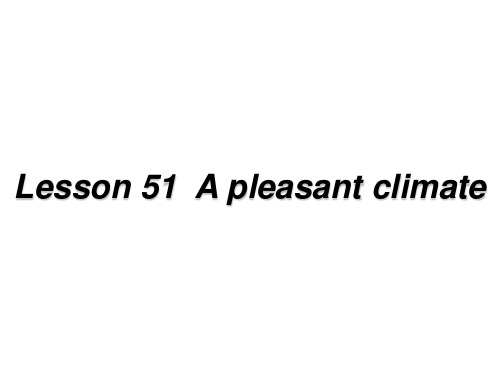
• It rains sometimes.
• Is it cold or warm in autumn.
总结:It指代天气,在翻译中注意。
• 6. June [dʒu:n] n.六月
• 7. July [dʒʊ‘lai] n.七月
New words (新单 词)
• 8. August [‘ɔ:gəst] n.八月
• 9. September [səp‘tem bə] n.九月
• 10. October [ɔk‘təʊ bə] n.十月 • 11. November [nəʊ‘vem bə] n.十一月 • 12. December [di‘sem bə] n.十二月
Lesson 51 A pleasant climate
• 1. warm [wɔ:m] adj. 温暖的
New words (新单 词)
• 2. climate [‘k lai mi t] n.气候
• 3. country [‘kʌn tri] n.国家
• 4. pleasant [‘p le zən t] adj.宜人的 • 5. weather [‘we ðə] n.天气 • 6. sometimes [‘sʌm taim z] adv.有时
短
1. come from
2. a pleasant climate
语
来自于
ry
4. in spring 5. in March
在你们国家
在春天 在三月
6. every day
每天
语法知识沉淀(1)
• Where do you come from? I come from China. • What nationality are you?
新概念1NCE1-Lesson51-52
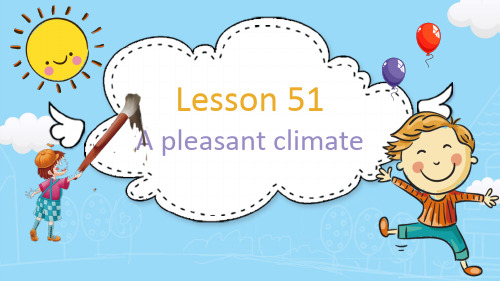
报
weather bureau 气象局
Warming-up
snow
rain
sun
Weather
wind
cloud
storm
What's the weather like in the picture?
fog/foggy wind/windy
rain/rainy snow/snowy
cloud/cloudy sun/sunny
June
July August
autumn [ˈɔːtəm]
n. 秋天;成熟期;渐衰期, 凋落期 adj. 秋天的,秋季的 n. (Autumn)人名;(英)奥特 姆 • September • October • November
winter [ˈwɪntə(r)]
• December • January • February
September and October. It’s often cold in November and it rains sometimes.
HANS: Is very cold in winter?
DIMITRI: It’s often cold in December ,January and February. It snows sometimes.
warm adj. 温暖的
The weather is getting warm.
warm tea
温热的茶
warm-hearted 热情的
warm-up 热身
summer [ˈsʌmə(r)]
n. 夏季;全盛时期 vi. 避暑;过夏天 adj. 夏季的 n. (Summer)人名;(德) 祖默;(英)萨默
- 1、下载文档前请自行甄别文档内容的完整性,平台不提供额外的编辑、内容补充、找答案等附加服务。
- 2、"仅部分预览"的文档,不可在线预览部分如存在完整性等问题,可反馈申请退款(可完整预览的文档不适用该条件!)。
- 3、如文档侵犯您的权益,请联系客服反馈,我们会尽快为您处理(人工客服工作时间:9:00-18:30)。
练习
P104 I come from England ,but Stella _____ from Spain .
comes
Homework
1.背Lesson51单词 2.预习Lesson53-54
或询问人物或事物的外观或特征: What's your brother like? 你兄弟是个什么样子? What's your house like? 你的房子是什么样的?
许多形容词可用以回答What…like? 这样的问题,并可根据上下文给以笼 统的或确切的信息。例如课文中表示 天气或气候的形容词有pleasant(宜 人的),windy(有风的),hot(热 的),cold(冷的),warm(温暖的)
October
2015
April
November April October May August January December February March July September June
一月 二月 三月 四月 五月 六月 七月 八月 九月 十月 十一月 十二月
Teacher's Day
一般现在时,表示通常性、规律性、 习惯性的状态或者动作的一种时态,常 与always, often, usually, sometimes, every day等连用。
在描述一个动作多久发生一次时,可以用以下这些词: every day always often sometimes
我们每天都喝牛奶。Every day we drink milk. 我们总在下午上英语课。 We always have English classes in the afternoon. 她通常下课后打篮球。 She usually plays basketball after school. 他经常坐公共汽车上学。 He often goes to school by bus.
Review
butcher meat beef lamb husband steak
卖肉的 肉 牛肉 羔羊肉 丈夫 牛排
mince chicken tell truth either
肉馅 鸡 告诉 实情 也不
Lesson 51
What’s the weather like?
Pop kids
August
Christmas Day
New Year's Festival
January Children's Day June the birthday of our Party July
Travel the world.
② ③ ⑩⑦ ⑧⑤ ⑥ ⑨⑿ ①
④
⑾
Country 国家
Germany 德国
H: What’s it like in summer? D: It’s always hot in June, July and August. The sun shines every day.
H: Is it warm in autumn? D: It’s always warm in September and October. It’s often cold in November and it rains sometimes.
Where does she/he come from ?
She/He is from Spain/ comes from She/He is Spanish.['spæ nɪʃ]
Where does she/he come from ?
She/He is from France/ comes from She/He is French.[frenʃ]
H: Is it very cold in winter? D: It’s often cold in December, January and February. It snows sometimes.
频率 副词
sometime s often
always
10 20
30
40
50
60
70 80 90 100
I come from________.
2.What’s the weather like in_________? It’s ____.
H: What’s the weather like in spring? D: It’s often windy in march. It’s always warm in April and May, but it rains sometimes.
Lesson 52 What nationality [næ ʃə'næ lɪtɪ] are they? Where do they come from?
the U.S.
Russia
Holland
Brazil
Sweden
Spain
Norway
Italy
Germany
France
England
Greece
Brazil [brə'zil] 巴西
the US
Holland ['hɒlənd] 荷兰
England ['iŋɡlənd] 英国
France [frɑːns] 法国
Germany ['dʒɜːmənɪ]德国
Italy ['ɪtəlɪ] 意大利
Norway ['nɔ:wei] 挪威
snowy
sunny
What’s the weather like?
Pop kids
rainy
windy
What’s the weather like?
cold
hot
What’s the weather like?
What’s the weather like?
sunny
hot
snow
windy
Women's Day
Thanksgiving Day National Day Labors’ Day April Fool's Day
September March November October May April December
Valentine’s Day Army Day
February
spring
summer
autumn
winter
summer
winter
spring
autumn
['snəʊɪ]
weather
['klaʊdɪ]
['wɪndɪ]
['weðə]
Every season has three months.
How many months in a year? What are they?
Russia ['rʌʃə] 俄罗斯 Spain [spein] 西班牙
Sweden['swi:dn] 瑞典
Where are you from ?
I am from the U.S ./ come from I am American.
Where are you from ?
I am from Russia / come from I am Russian.
Countries The US Brazil[brə'zil] Holland England France Germany Italy Norway Russia Spain
People American Brazilian Dutch/Hollander English French German Italian Norwegian Russian Spanish
Where do they come from ?
They are from Holland/ come from They are Dutch/Hollander.[dʌtʃ]
Where do they come from ?
They are from Sweden/ come from They are Swedish.['swi:dɪʃ]
season spring
climate
months
summer autumn winter
Fill in the blanks.
rain sandstorm windy cold
season short snow hot
In Beijing, it is _____ in winter, and it cold ____ usually. In summer, it is ____ snows hot and short it often _____. rains Spring is very ______ and there is little rain but it's quite windy _____and sometimes there are_________. sandstorm Autumn is the best ______in Beijing. It's very comfortable. season
Spain 西班牙
the U. S. 美
Brazil 巴西
U. K.英国
Sweden 瑞典 Norway 挪威 France 法国
Sweden
Norway
Brazil the U. S.
Italy Germany
France
Russia
Holland
U. K. Spain
1.Where do you come from?
